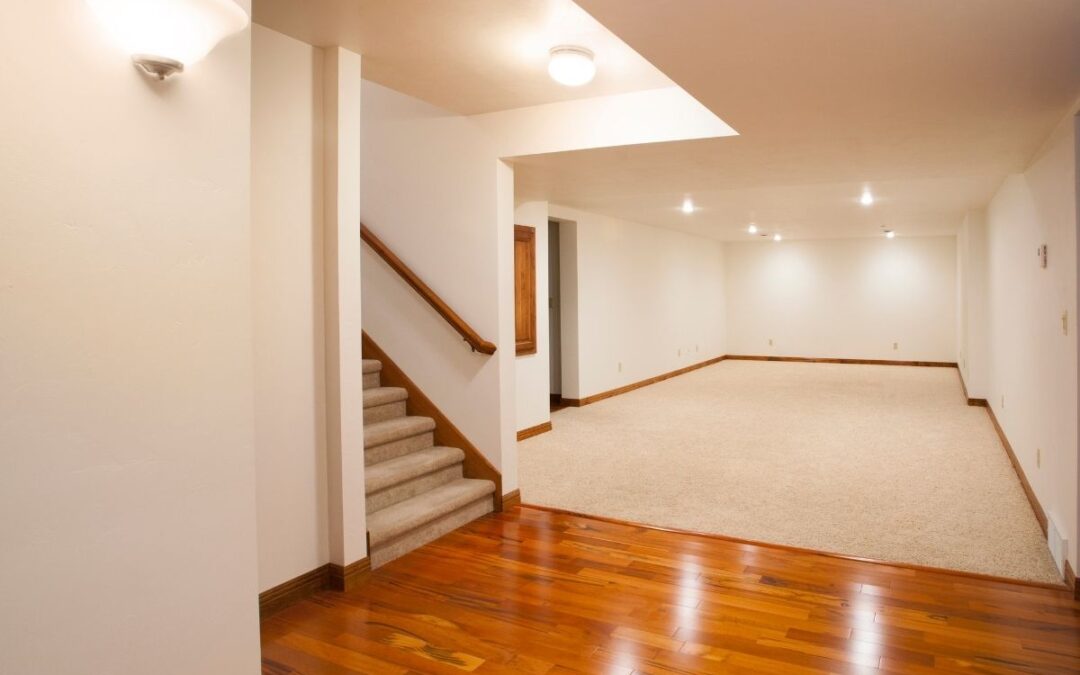When you are looking at all the different basement flooring options, there are key factors to remember. Basement flooring does not follow the standard flooring regulations. Because of its near closeness to the earth, basement flooring may leech leftover moisture in the form of vapor even when the weather is dry. There are many additional methods for water to infiltrate your basement. Basements may be the scene of the sort of up-to-your-ankles flooding that we all fear and the scene that keeps insurance firms in business after heavy rains. So the main issue with basement flooring is moisture: how to avoid it and how effectively the floor will dry out if it becomes wet.
The good news is that there are several basement flooring alternatives to choose from. However, keep in mind that the circumstances in the basement are not the same as those upstairs. These distinctions influence not just your flooring options but also the installation process. Keep reading EnRich Construction’s pros and cons of the different flooring options as you begin your basement remodeling project.
Remodeling Your Basement – Tips and Flooring Options
First, repair the concrete.
Whatever type of basement flooring you pick, make sure to repair any issues with the existing concrete floor. For example, is the concrete surface rough or uneven in any places? Are there any cracks big enough to let in a dime? Is there any displacement, such as a part of the floor that has broken and shifted up or down? Is there water in the basement when it rains? Be sure to fix any issues before installing new basement flooring; otherwise, you will have issues in the future.
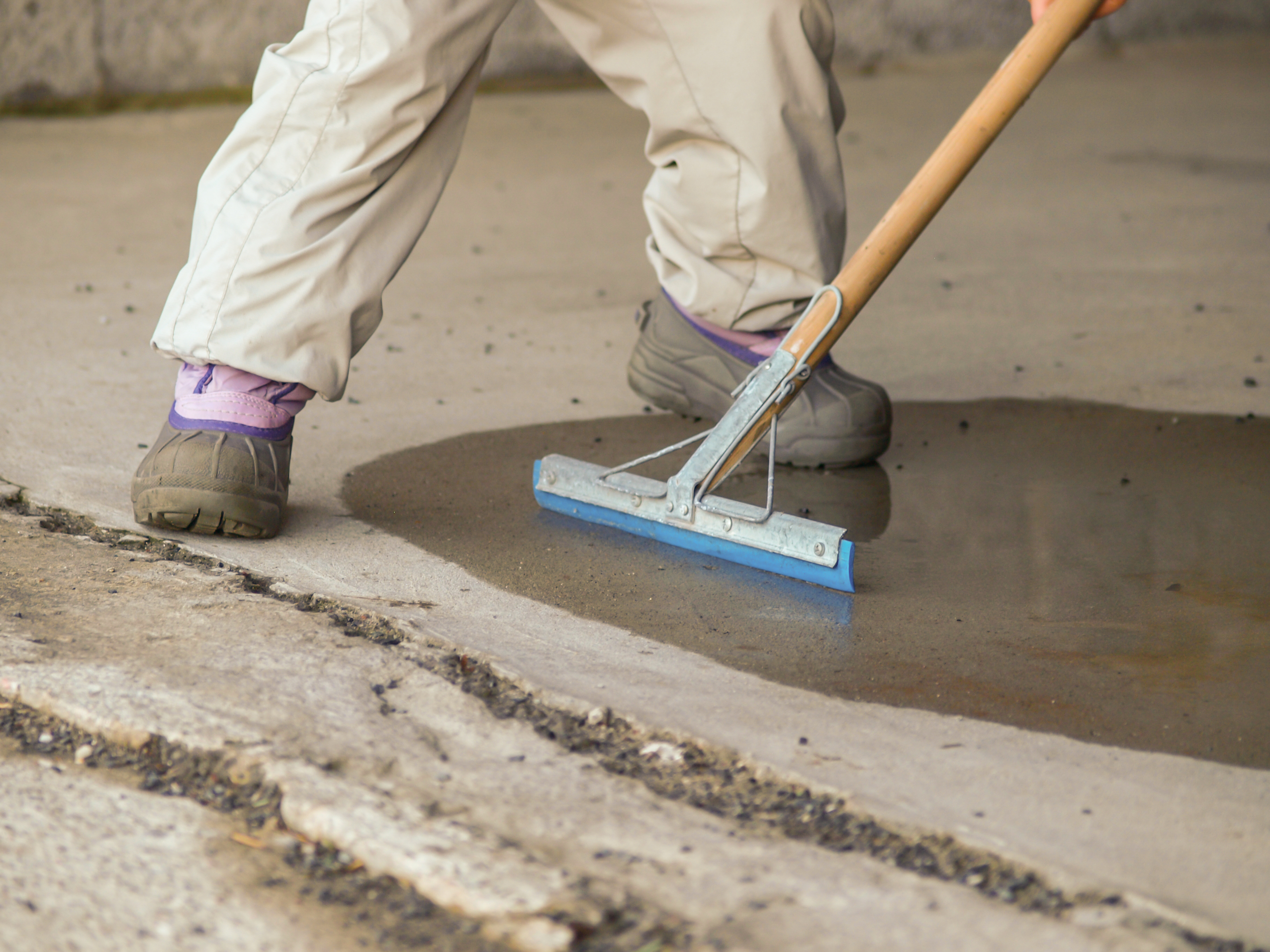
Subflooring Options for the Basement
Many basement flooring materials, such as paint, epoxy, tile, and rubber flooring, can be installed directly over the basement’s original poured concrete floor if it is in excellent shape. However, this installation will result in a chilly floor.
A chilly floor may be acceptable in an area utilized as a workshop or fitness room. However, if your refinished basement will be a family room, home theater, or children’s playroom, you might consider installing a subfloor over the concrete. A well-installed subfloor will provide a level, insulated base for the completed floor of your choosing, ensuring extra warmth underfoot.
Basements necessitate the use of subflooring that will not deteriorate or collect mildew with exposure to moisture. There are many types of subflooring options available, each with its drainage area for any moisture on the concrete, firm foam insulation, and a composite surface that acts as the substrate for completed flooring.
Choosing The Right Flooring for Your Basement
When remodeling, choosing basement flooring can be a tough decision, with many things to consider. First, how do you plan to use your basement? Second, do you live in a region that has exceptionally cool weather? And, do you have a specific style that you are trying to achieve? Below are some excellent basement flooring options to consider.
Vinyl Flooring
Vinyl flooring is one of the best basement flooring alternatives, alongside concrete and ceramic tile. There is a distinction between sheet vinyl flooring and tile/plank vinyl flooring. Sheet vinyl flooring produces a nearly smooth, water-resistant surface on your basement floor, which is always a good thing when moisture is present. If water is left standing for an extended period, the many seams in tile vinyl flooring may allow moisture infiltration. For those looking for inexpensive basement finishing ideas, vinyl flooring is a great choice.
Pros:
- Water is kept at bay.
- Low-cost, generally cents per square foot.
- It is more comfortable to the touch than ceramic tile or concrete.
Cons:
- Frequently seen as a low-cost repair.
- Adhesion requires a very clean surface.
- Installation of sheet vinyl is not often a do-it-yourself activity.
Ceramic or Porcelain Tiles
Tile is an excellent option when it comes to basement flooring selections. It is a finished surface instead of a raw surface, such as concrete. Additionally, it does not require additional treatment, as concrete does.
Ceramic or porcelain tile may be laid directly on a concrete slab. Because tile over concrete can be chilly, you may consider adding radiant heating to warm the tile surface by sandwiching it between the concrete and the tile.
Pros:
- In the case of flooding, it dries out and is unharmed.
- Tile installation in tiny spaces is a do-it-yourself activity.
- It will never decay.
Cons:
- If the temperature is a concern, radiant heating is a must.
- Sound absorption is poor.
- Concrete floors may require leveling and repairs as there is no subfloor to compensate for faults.
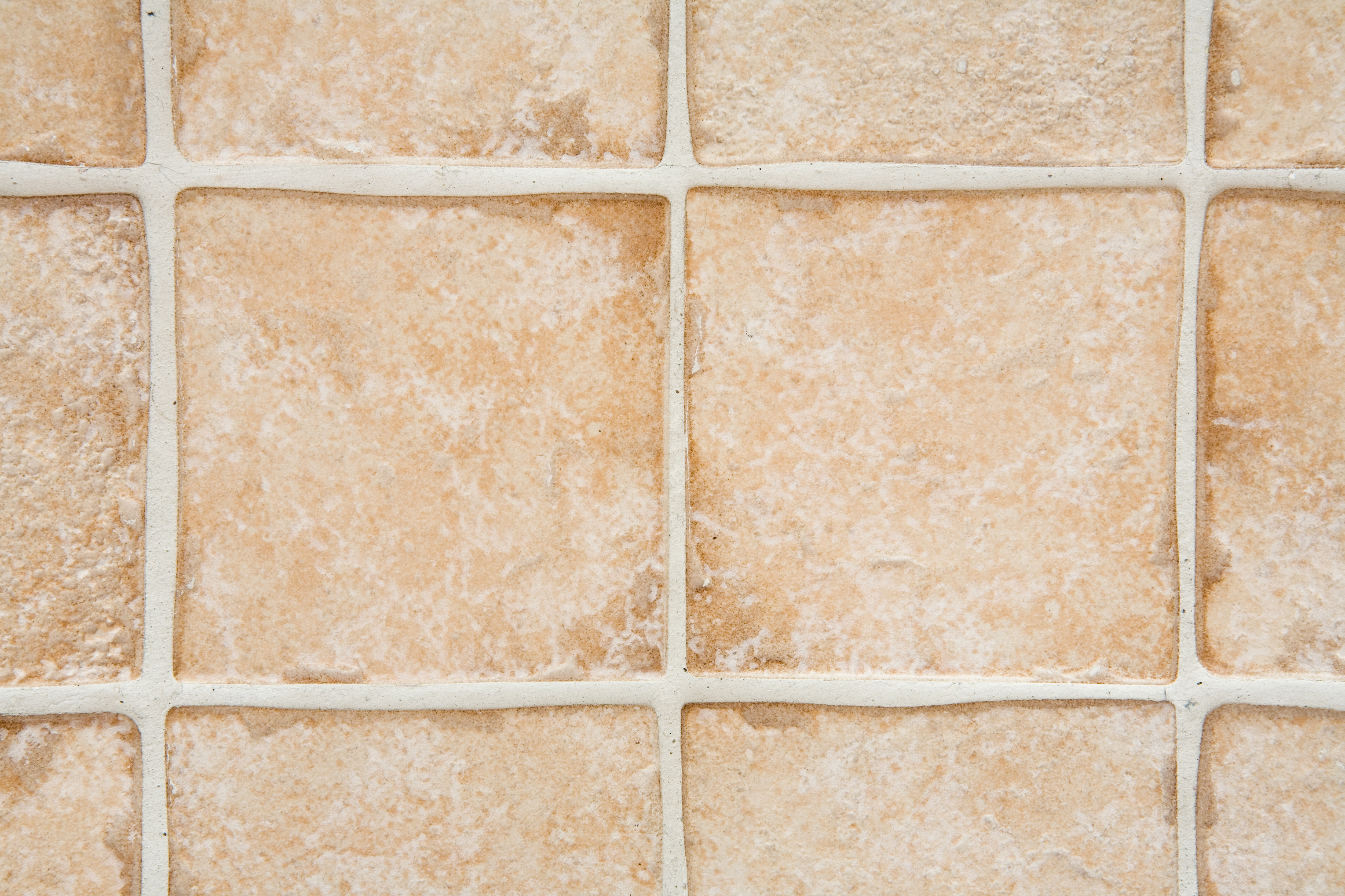
Flooring Made of Engineered Wood
Because wood is sourced from trees and is biological, it cannot withstand moisture for an extended period. As a result, hardwood flooring is not a good option for basement floors. Engineered wood flooring, on the other hand, is a different matter. Engineered wood flooring is dimensionally stable because the cross-hatched plywood substrate beneath the actual wood veneer retains its form even when exposed to small amounts of moisture.
Pros:
- It stands up nicely to light wetness.
- One of the most appealing basement flooring alternatives.
- Excellent sound absorption characteristics.
Cons:
- Engineered wood flooring requires subflooring.
- It can be expensive in comparison to other flooring types.
- Because it is nailed or stapled to the subfloor, it is more difficult to remove in the case of water damage.
Tile or Luxury Vinyl Plank
Luxury vinyl flooring is a contemporary form of resilient flooring compared to the traditional variety that is adhered to the subfloor using glue. Instead, luxurious vinyl is linked together. Additionally, luxury vinyl flooring is a beautiful alternative to wood or stone, and it looks strikingly similar.
Wood-look premium vinyl is quite thick and provides a more natural wood grain look and feel. Stone-look luxury vinyl tile attempts to mimic the appearance of slate, travertine, marble, and other popular stones but in the shape of a vinyl tile.
Pros:
- A thick wear layer offers higher durability than a standard sheet or tile vinyl flooring.
- A floor that is up to twice as thick as standard tile or sheet flooring offers a slightly warmer floor.
- It looks like natural wood and stone and has many options.
Cons:
- Because some homeowners may regard vinyl tile as an inferior material, luxury tile may not result in a higher resale value.
- Luxury vinyl plank and tile, being a seamed floor covering, may seep moisture down to the subfloor in the case of floods.
- Costlier for a product that is still fundamentally a vinyl tile.
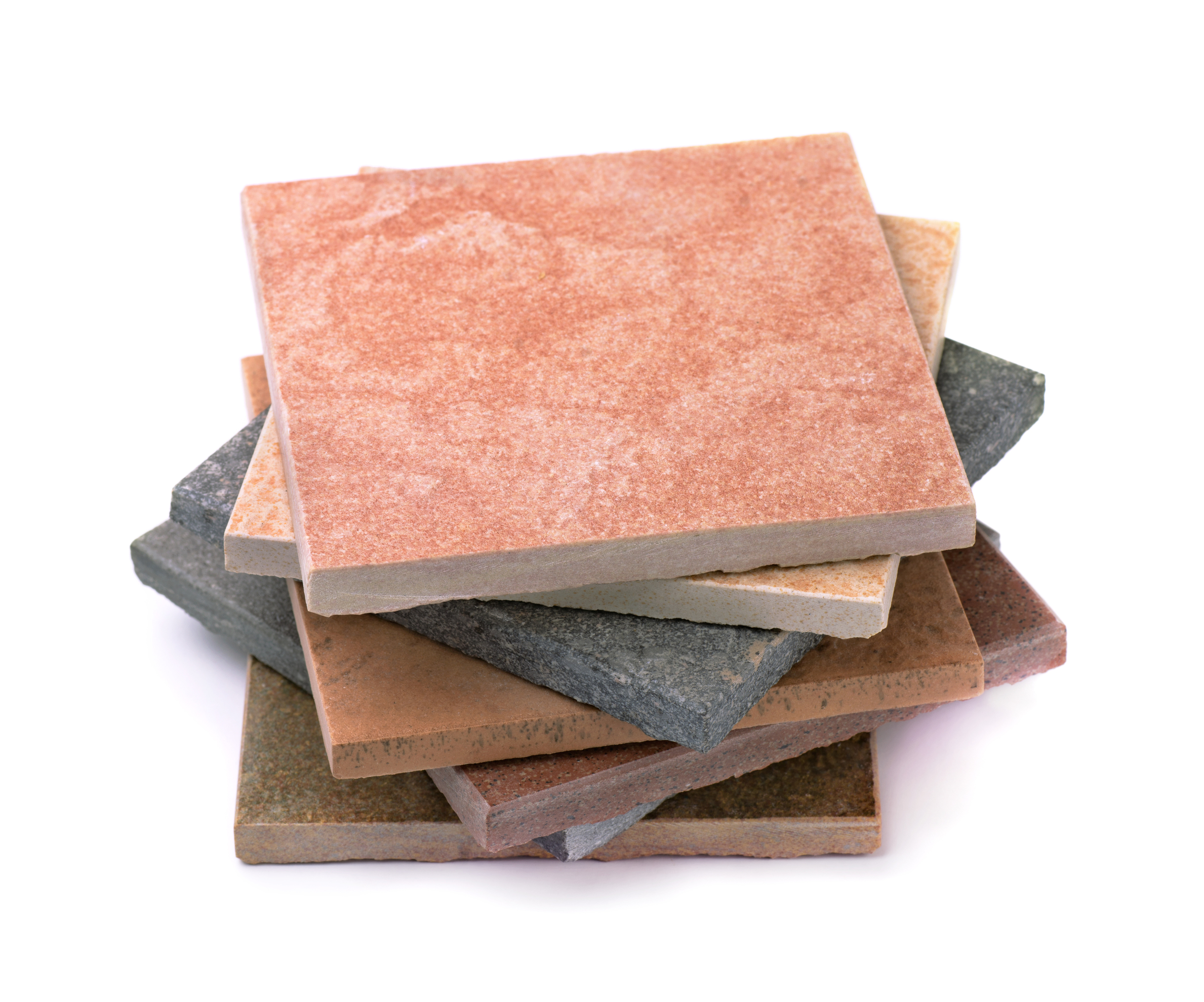
Flooring Made of Concrete
Concrete has gained popularity among homeowners as views regarding utilitarian surfaces have shifted. Concrete does not have to be left in its unfinished form. You can paint or stain concrete, providing a more finished result. In reality, if considerable patching is required, painting is the sole option for concealing the patches.
Tip: If you pick concrete flooring for your basement, make sure you coat it with a waterproofing sealer to keep moisture away.
Pros:
- The most water-resistant basement flooring choice available.
- It necessitates the least number of supplies.
- There is no need for a subfloor.
Cons:
- Concrete flooring is the coldest of all basement flooring alternatives, with no method to heat it.
- Poor sound quality is a significant disadvantage if you want to create a home theater in your basement.
- It takes more time and effort than one may think since concrete must be thoroughly scraped and cleaned before being painted.
Flooring using Plank Tiles
Plank-sized porcelain tile flooring is resistant to moisture and, thanks to its vividly drawn images, seems to be natural wood. It is well-known and respected as a highly durable surface. Because it is so long-lasting, it is being used in high-traffic locations such as restaurants and other commercial places. The primary distinction between plank tile and ordinary tile is that the margins of plank tile are corrected. Because of the 90-degree edges, tiles are fitted edge-to-edge, with no mortared grout lines.
Pros:
- Increasingly seen as a status symbol, resulting in a greater selling value
- Attractive appearance and waterproof.
- Rectified edges imply fewer grout lines.
Cons:
- Typically more costly than standard-sized tile.
- Because it is still ceramic tile, it feels chilly underfoot unless you install radiant heating.
Flooring Options – Carpeting
Carpeting is often considered a bad choice for high moisture rooms, such as bathroom flooring. This is because carpet takes a long time to dry and can harbor mold and mildew. But that does not mean carpet is a poor choice for basement flooring.
Basements, with the exception of extreme cases such as floods, have less moisture than even the ordinary bathroom. Therefore, carpeting in basements can be a perfect choice, depending on how you intend to use the space.
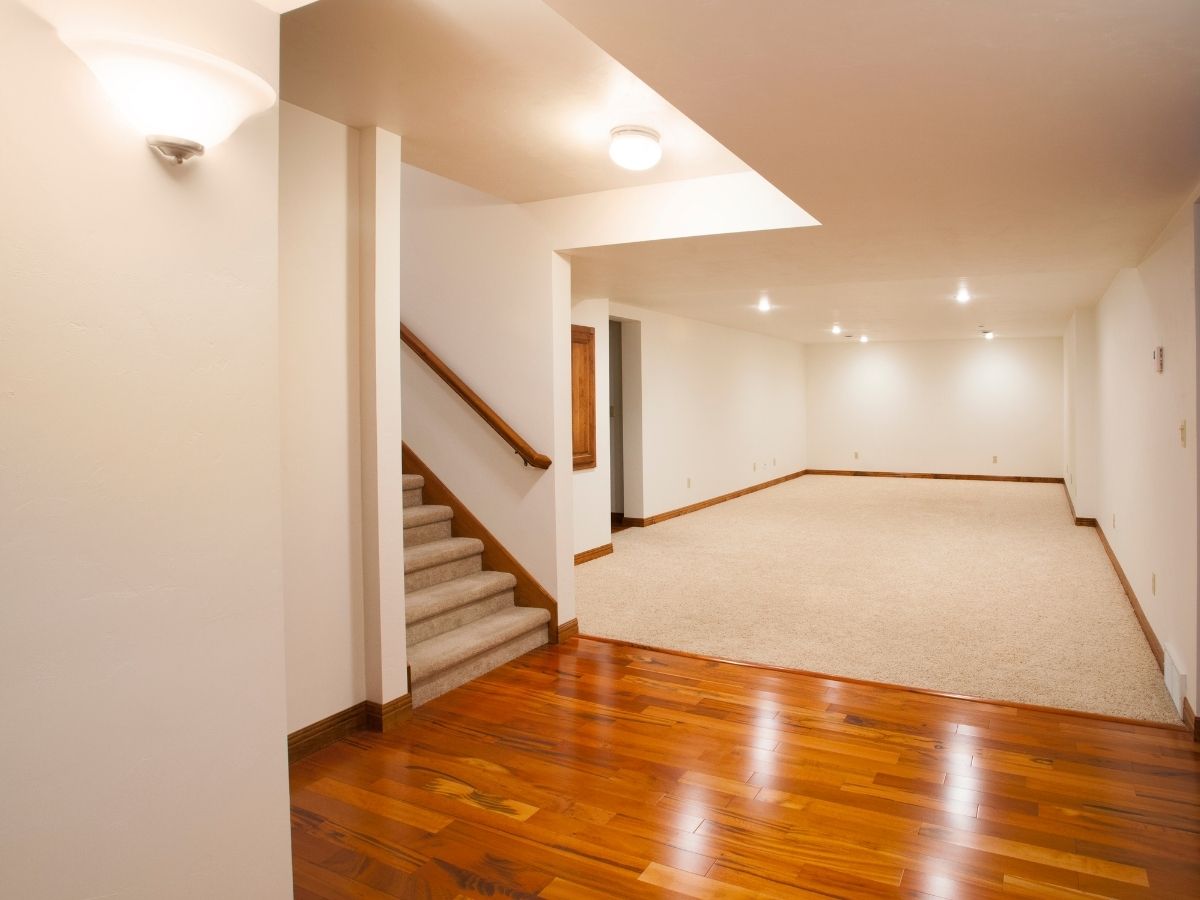
If your basement remains dry throughout the year, it might provide you with up to a decade of dependable service. However, be prepared to replace your carpet if you have a water-related disaster, such as floods from the outside, a broken pipe, or a faulty water heater.
Carpet squares are a unique alternative to standard carpet. Carpet squares are thicker and have many design options to choose from. Unfortunately, carpet squares, like standard carpet, must be replaced when there is water damage. On the other hand, carpet squares may be selectively removed and replaced. You will generally need to remove and replace the entire floor when it becomes water damaged when you have traditional carpeting.
Pros:
- Even without installing radiant heating, this is one of the hottest basement flooring alternatives.
- Enhances the sound quality of home theaters.
- An excellent alternative for young children who play on the floor.
Cons:
- Quite pricey, especially if you choose thicker heaps and cushioning.
- Though carpet may dry, it frequently requires industrial-quality drying equipment or services to complete the task to prevent mold from forming quickly.
Laminate Flooring
Because of enhanced image layer graphics and thicker surfaces for deeper embossing, laminate flooring is more appealing than ever before. However, there are some concerns regarding moisture issues beneath the surface. When the base material is exposed to water for an extended period, it swells and remains that way indefinitely. Therefore, no amount of drying will allow the laminate to shrink back to its original dimensions. Furthermore, the top image and wear layers will begin to peel away. If laminate flooring becomes water-damaged, it must be replaced.
With the construction of a proper underfloor system, conventional laminate flooring in the basement can be functional. The subfloor and the foam underlayment of the laminate protect against water vapor rising from the concrete slab. In addition, if there is minor flooding, the underfloor system will raise the laminate flooring above the water.
Pros:
- Because of its foam layer, laminate flooring is one of the warmest basement flooring alternatives.
- Do-it-yourself installation is simple.
- Sound absorption is adequate.
Cons:
- Water damage is a significant concern.
- Installation of a subfloor is optional but highly recommended.
- Underfoot there’s a hollow sensation.
- Static electricity can accumulate.
Rubber Flooring
Rubber flooring is common in gyms, garages, dancing or martial arts studios, and swimming pools. But can rubber flooring be used in basements as well?
If your basement is a play area rather than a formal living space, you may consider this type of flooring. Otherwise, most households will not be able to benefit from rubber flooring. Roll rubber, common in commercial gyms, has the fewest seams. Interlocking rubber tiles are priced around the same and simple to install since they slot together like a puzzle.
Pros:
- Maximum resistance to basement subfloor temperatures.
- Walking on a soft surface.
- It is resistant to dampness.
Cons:
- It is not aesthetically pleasing for living areas.
- Water can still escape between seams, especially with interlocking rubber tiles; therefore, it is not waterproof.
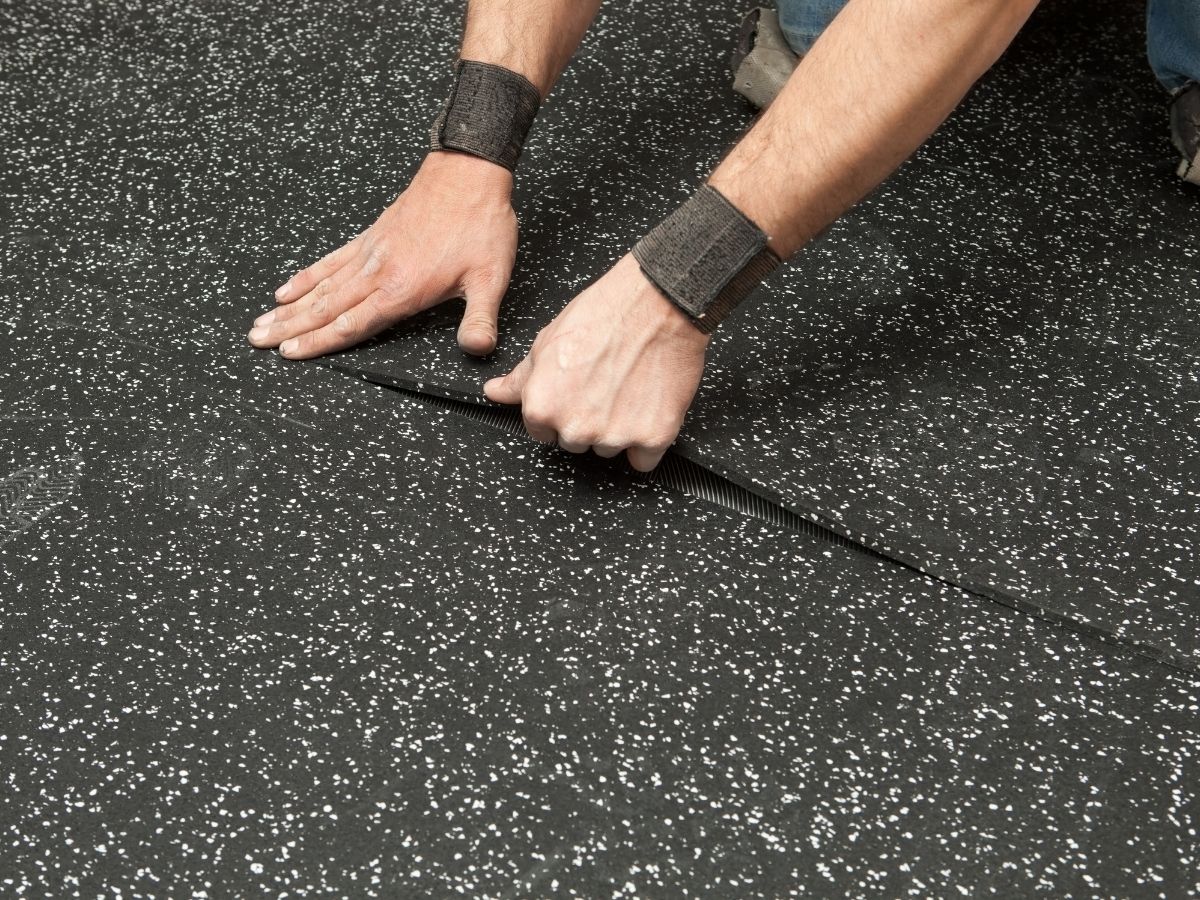
Cork Flooring
Cork is a naturally occurring substance generated from cork trees. Cork flooring is soft underfoot, easy to walk on, and warm. However, it is susceptible to water damage because it is an organic substance. Therefore, if you decide to put cork flooring in your basement, you must first build a subfloor system.
Pros:
- Cork is an excellent insulator against chilly basement flooring.
- It’s comfortable to walk on.
- Sound absorption is excellent.
Cons:
- Cork is prone to degradation since it is organic.
- Rolled cork can be difficult to install on a do-it-yourself basis, necessitating expert installation.
Last Notes on Flooring Options
As you are remodeling your basement, many decisions must be made including which flooring is best. We hope the above flooring options make your decision easier. Not only are we here to help you with decision-making, but EnRich Construction is the team to call if you are looking for professional help with home remodeling, repairs, and renovations. Whatever your project is, we have you covered. Give us a call today to learn more about the most trusted contractor in the Mid-Missouri area.

